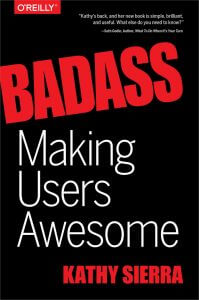BadAss Making Users Awesome by Kathy Sierra
This book will teach you to how to make an awesome user of your product than just making an awesome product.

To make users advance from beginner to expert, it takes
- Better practice with feedback.
- Developing an appetite for deep perceptual knowledge and skills through high-quantity and high quality.
- Dealing with cognitive resource leaks.
Better practice with feedback
I'd perceived practice as long, hard session of doing the repeated task. No matter even if I'm bored, I did things for the sake of doing to better at it. Repeated task breed mediocrity and boredom. It makes things permanent and locks in whatever is practiced. I started to do things without consciously involving on it. Kathy has dealt that behavior in detail on why it is important to move tasks from half assed skill to half a skill.
Peter norvig also describes how a deliberate practice is important to improve one's skill in his classic Teach Yourself Programming in Ten Years
Researchers (Bloom (1985), Bryan & Harter (1899), Hayes (1989), Simmon & Chase (1973)) have shown it takes about ten years to develop expertise in any of a wide variety of areas, including chess playing, music composition, telegraph operation, painting, piano playing, swimming, tennis, and research in neuropsychology and topology. The key is deliberative practice: not just doing it again and again, but challenging yourself with a task that is just beyond your current ability, trying it, analyzing your performance while and after doing it, and correcting any mistakes. Then repeat. And repeat again. There appear to be no real shortcuts: even Mozart, who was a musical prodigy at age 4, took 13 more years before he began to produce world-class music. In another genre, the Beatles seemed to burst onto the scene with a string of #1 hits and an appearance on the Ed Sullivan show in 1964. But they had been playing small clubs in Liverpool and Hamburg since 1957, and while they had mass appeal early on, their first great critical success, Sgt. Peppers, was released in 1967. Malcolm Gladwell has popularized the idea, although he concentrates on 10,000 hours rather than 10 years.
We should constantly examine our Mastered bucket, and start looking for a scope to better.
Developing an appetite for deep perceptual knowledge and skills through high-quantity and high quality
In order to be an expert we need to take a different approach by watching/listening or being surrounded by experts. It is demonstrated through chicken sexing, perceptual learning in flight training anecdotes. Our brains recognizes a pattern on being exposed to such magnitude of high quality content.
Dealing with cognitive resource leaks
Having not to think about every day outfits is good. Making too many decisions the drain the mental energy and you should provide good enough defaults for your users to run out of the box. Wanting the users to take too many decision can have unintended health effects
Because on their deathbed, our users won't be thinking,"If only I'd spent more time engaging with brands."
We all think that choice is awesome we give the user lots and lots of choices.But we know, this is not actually what they feel. When were confronted by choices. This is what they feel. When they have choices. Because even after they make the choices, it’s still stressful, their still leaking resources. So it doesn’t mean, don’t give them choices, but you don’t force them to make those choices. So if they have trusted filters and defaults, it’s a huge benefit, and we also have micro leaks. Micro leaks are just the tiny little things that add up that you worry about right? I did turn off the oven; I did switch my phone on airplane mode right? It’s not going to actually buzz while I’m in the theatre right? So, death by 1,000 cognitive micro leaks.
If your UX asks the user to make choices, for example, even if those choices are both clear and useful, the act of deciding is a cognitive drain. And not just while they're deciding... even after we choose, an unconscious cognitive background thread is slowly consuming/leaking resources, "Was that the right choice?"
Understand cognitive leak, the app user has got a life to live and be mindful of it. Never plague your app with options, pre-configure defaults wherever possible.
For my new posts, subscribe.